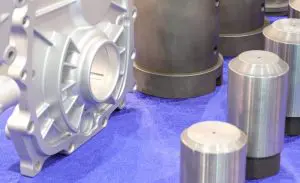Aluminium is one of the most abundant metals in the earth’s crust, making up about 8% of its mass. Zinc, on the other hand, makes up an estimated 0.004% of the earth’s crust; and ranks 24th in order of material abundance on earth. Despite their difference when it comes to abundance, both metals are widely used in a variety of die cast processes.
Prized for being light weight and resistant to corrosion Aluminium alloys are commonly used in the construction of automobiles and aircraft. Zinc alloys, on the other hand, are known for their heat dissipation qualities, strength, and durability. They are often used in the creation of components such as heat sinks, hard disk casings, housings for steering wheel locks, and more.
Table of Contents
Alloys and the Die Casting Process
As mentioned earlier, each alloy has its own unique properties and benefits, which are important in determining the die cast product’s strength, durability, and overall functionality. Read on to learn more about them.
Aluminium Alloys
Aluminium alloys are popular in die casting because they have a low melting temperature, good fluidity, high castability, and excellent corrosion resistance. Aluminium can be alloyed with a variety of elements to create an even wider range of properties. Some common Aluminium alloys used in die casting include:
Aluminium Alloy 360 – Also known as ADC 3, A360 is an Aluminium alloy that offers excellent ductility, is great at withstanding higher temperatures, and has a high resistance to corrosion thus making it a perfect candidate for aerospace applications.
Aluminium Alloy 380 – Also known as ADC 10, this is the most widely used and popular Aluminium alloy. It has good fluidity and castability, making it ideal for complex shapes. A380 also has excellent corrosion resistance and is also a good thermal and electrical conductor.
Aluminium Alloy 383 – Also known as ADC 12, A383 is an alloy that retains strength at very high temperatures, and has great fluidity when molten. It is also highly resistant to corrosion. Should there be intricate parts that need the precise characteristics of die-filling, A383 is the most sought after Aluminium alloy for the job.
Zinc Alloys
Zinc alloys are also popular in die casting because they have a low melting temperature, good fluidity, and high castability. Like Aluminium, Zinc can be alloyed with a variety of elements to create an even wider range of properties. Some common Zinc alloys used in die casting include:
Zinc Alloy 3 – Also known as ZAMAK 3, this is the standard Zinc alloy used in die casting. It has good ductility and corrosion resistance, making it ideal for parts that need to be formed or shaped after casting.
Zinc Alloy 5 – Also known as ZAMAK 5, this Zinc alloy is tougher than ZAMAK 3 as it has additional Copper percentage to improve resistance, strength, and hardness. ZAMAK 5 is often used for components that require a higher degree of precision.
Zinc Alloy 7 – Also known as ZAMAK 7, this is a high purity Zinc alloy that contains low levels of Magnesium, thus giving it better ductility to manufacture components that are more intricate in nature.
Aluminium vs Zinc Alloy
While both Aluminium and Zinc alloys have their own unique properties and benefits, there are also some key differences between them. Aluminium alloys are typically softer and more malleable than Zinc alloys. They are also less resistant to wear and tear. Zinc alloys, on the other hand, are usually harder and stronger. They are also comparatively more resistant to corrosion.
But which one is better? It all boils down to the intended application and requirements of your die casting project. For instance, if you need a metal that is light and corrosion resistant, an Aluminium alloy would be the better choice. However, if you need a metal that is strong and durable, a Zinc alloy would be the better option.
Choose EKO for Your Die Casting Needs
It is never easy to figure out which Aluminium alloy or Zinc-based alloy is the correct fit for your project’s parts. No matter which type of alloy you choose, here at EKO Industries, you can be sure that your parts will have high degrees of accuracy and detail, as we work together with you to manufacture them to near net shapes. Contact us today to find out more about our die casting process or some of our other manufacturing capabilities today.



